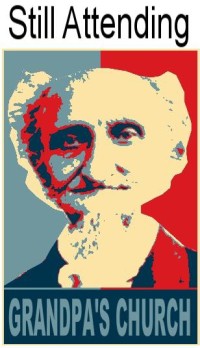
 It has been a while since I’ve updated our ITunesU Mockingsyllabus, so consider this some last-minute beach listening pleasure for all of you who are looking for a way to pass the time putting the finishing touches on your tan. For all of you who want to broaden the repertoire of your innocuous Cocktail banter by adding “relative successes of the Vietnam War” to Original Sin, Law/Gospel and the bound will, this collection is for you.
It has been a while since I’ve updated our ITunesU Mockingsyllabus, so consider this some last-minute beach listening pleasure for all of you who are looking for a way to pass the time putting the finishing touches on your tan. For all of you who want to broaden the repertoire of your innocuous Cocktail banter by adding “relative successes of the Vietnam War” to Original Sin, Law/Gospel and the bound will, this collection is for you.
1. History of the International System: James Sheehan, Stanford
In our polarized world of sound-bite partisanship, it is instructive and humbling to actually learn about how complicated and difficult the modern political system has become. This class will make you think twice (or for the first time) the next time you read Nicholas Kristof or Glen Beck.
 2. Reading the Decalogue: Wheaton
2. Reading the Decalogue: Wheaton
God knows that this will not be the last word on His (in)famous 10, but this collection of differing interpretations of the 10 Commandments within different theological systems is required listening for anyone who is interested in the way the concept of the Law has been utilized in theology throughout history. Of particular interest to us are the lectures on Luther, Calvin, Lancelot Andrewes and Barth. On the whole, and for what it’s worth, it confirmed my suspicions of Calvin, further confused me about Barth, deepened my appreciation of Luther and gave creedence to the argument that “morality” is the real (and unfortunate) Anglican heritage. Listen to it and see what you think!
 3. Aesthetics: Jeffrey Wattles, Kent State University
3. Aesthetics: Jeffrey Wattles, Kent State University
From Plato to Derrida, this class helps illustrate that there is neither a spoon nor a line between the questions raised by theology and philosophy.
4. Christ and Human Thought: Cornelius van Til, Westminster Theological Seminary
This is an example of the way the word “theologian” used to be synonymous with “polymath.” The audio is a little weak, but this is well worth the effort.
 5. Worldview Everlasting: Revd. Jonathan Fisk
5. Worldview Everlasting: Revd. Jonathan Fisk
Ever been embarassed by your inability to explain the theological and pastoral significance of the Genus Maiestaticum? If so, there is good news: you no longer have to live in fear or shame. While not technically an offering from ITUnesU–yet–Rev. Fisk (whom some of you may have met at the recent Mockingbird conference) has a 10 minute video podcast that will make all of your wildest dreams come true.
Well, that’s about it. I would love to hear of any classes you all have found helpful and/or interesting. Day-by-day, you too can atone for the time you spent perfecting your foosball goalie shot (see below) instead of applying yourself to more “traditional” educational opportunities.

COMMENTS
10 responses to “Another Summer Ends: ITunesU Playlist”
Leave a Reply













Jady, i feel like i might be making progress with you and barth…you are now "confused" about rather than "suspicious" of! ;D
"Grace in the Church" from RTS wasn't bad! I've often thought about posting something from it for a while now… really helpful and thoughtful stuff! ~B
Jady, Thanks so much for the Van Til link. He was one of the first "modern" theologians I read. As I understand it, F. Schaeffer got much of his presuppositional apologetics from him. Glad to see you pushing good Calvinist Reformed theologians on here 😉
I sent the Van Til link to one of my friends who's over at Covenant Theological Seminary. A few years ago another friend of mine did a lecture on Van Til and the implications of Trinitarian thought so it will be interesting to finally get a chance to hear van Til himself.
Michael, I've always thought the idea of "presuppositional apologetics" made a lot more sense—and dovetails nicely with a L/G hermeneutic, and Frances S. is definitely a hero of mine.
Regarding reformed theology, I would recommend the Calvin lecture—you'll see that many of my complaints, at least as far as his view on the role of the Law, are at least in keeping with contemporary scholarship and (I was relieved to see) not far off base.
I'd be interested in your thoughts, particularly. . .
Jady, I was at L'Abri in the 70's when FS was still there and the amazing thing about him is that he was so full of grace to the searching and suffering young people who wandered through there, including me.
Also Jady, on the Calvin thing…thanks for this link and I will listen to it. I don't mean to dis "contemporary scholarship" in any way, but at this point in life I am just convinced that "primary sources" is the way to go. If one wants to really get a 3-D view of Luther, Calvin or anyone else, then read the "literature" to get a general view of the critical landscape, but then put that aside and read tons and tons of what Calvin, Luther, etc. actually wrote. Sometimes, it is surprising what comes to light.
What is meant by "suspicions" of Calvin? By no means is this question a feeble attempt at criticism or defensive-posturing, but rather, I honestly would like to better understand what you mean.
On another note, I totally agree. Secondary (and tertiary) sources certainly help us get a "big picture" view of theologians and their potential influences.
Dear Blair,
Aside from being my attempt at rhetorical flair, there is a long and venerable tradition of trying to minimize the differences between Calvin and Luther on the subject of the Law.
So, the suspicion I have is that despite what is often argued, there really is no way to reconcile the two positions, and the lecture series corroborated this.
The difficulty is that those people that I run into who disagree on the role of the Law—who even have a position:)–usually (it seems) are broadly in agreement on most things, share an evangelical zeal (ideally), and affirm the primacy of Justification by Faith.
So, there are ways of operating together without much trouble; however, there are ways in which disagreements over the theological question of the Law that influences and informs everything else.
For example: whether you believe that the Law is the eternal rule of God, that it will be present in Heaven (even as fulfilled) because it rests on the manifestation/emanation of God's Holiness will have dramatically different results than if you believe that the law, while still Holy, is nevertheless temporal, and has an only this-worldly importance and use, then you will end up somewhere else.
Anyway, much more can be said, and I commend the lectures to you as a good starting point. If you've ever read Dallas Willard, you can skip the Lancelot Andrewes (and say a prayer for the Anglican church:).
Dear Michael,
That is so cool that you were at L'Abri. I was slated to spent 6 months there after graduation, but then I met Liza:)
His book "Christian Manifesto" changed my life. Shortly after that, early in my junior year, I was given a wonderful book comparing and contrasting his and C.S Lewis' theology (Francis comes off better:) called: Francis Schaeffer & C.S Lewis: Lessons for a New Century from the Most Influential Apologists of Our Time
http://www.amazon.com/C-S-Lewis-Francis-Schaeffer-Influential/dp/0830819355
This book was one of the first that illustrated to me the importance of serious theological reflection AND how subtle differences can play out in significant ways—I couldn't recommend it more highly!
Along those lines– As for the lectures. I don't think that this is an example of the type "contemporary scholarship" that is trying to make the blue pen red. You would get very little argument, I think, about her presentation of Calvin.
The difficulty with talking about the differences between the two–Luther and Calvin, that is– can be best understood by looking at the EKD over here in Germany. The Lutherans and Reformed work together as broadly Evangelical and even subscribe to many of the same confessions; however, the theologians involved will be quick to point out the differences if you give them a chance.
Most people outside of the universities, however, particularly in light of the declining church attendance and general secularization, have very little time or concern for these seemingly minute and meaningless differences.
So, here on MBird (as you well know) we live in this tension too. This is why, among other reasons, we try not to broadside any other theological tradition unnecessarily.
This is why I tried to communicate my "suspicions" of Calvin's understanding of the Law as delicately as I could, because while there is no use running off people because of hot-button party loyalties, I also think that the differences are worth pointing out.
Love to you!
Jady